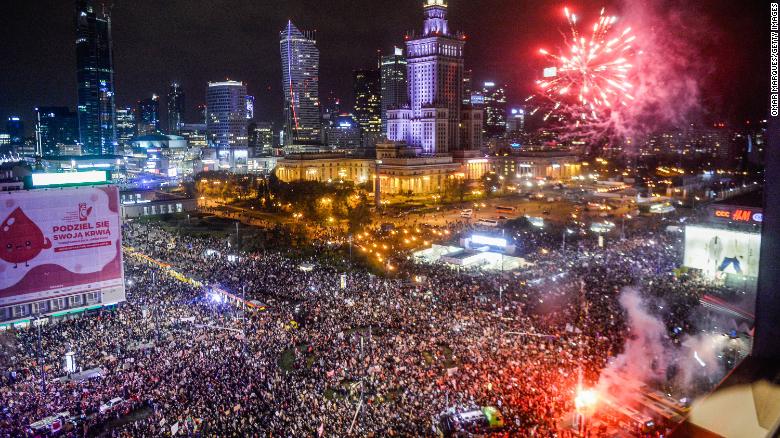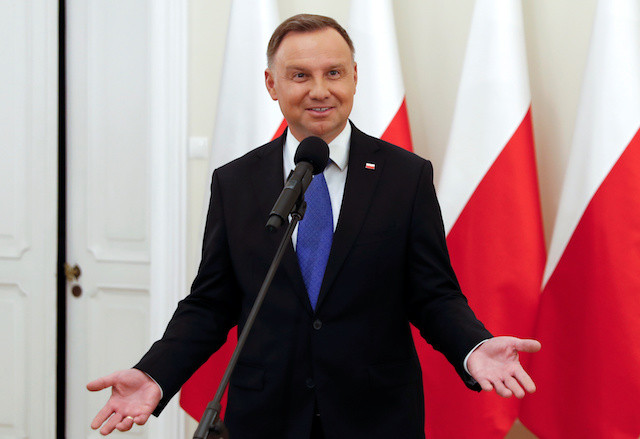Authoritarian Shift and “Strajk Kobiet” (Women’s Strike) in Poland
Source: CNN
Women in Poland have been protesting the government in the past few months. They reject the ruling party’s plan to ban abortions caused by congenital fetal defects, including the situation when the fetus is unlikely to survive. After this proposal, Poland, already a state with the strictest abortion law in Europe, will only allow abortion based on two causes, pregnancies caused by rape or incest and the ones posing danger to the woman’s survival. The proposal that was inaugurated on 22 October by Constitutional Tribunal (Poland’s highest court) triggered women to start taking the streets (Korycki, 2020). As time goes by, the movement is joined by many groups affiliating together against the conservative government and the strong influence of the Catholic Church in Poland (Gera, 2020). To better understand this problem, we need to dig deeper into the emergence of Poland’s Prawo I Sprawiedliwość (PiS) party.
PiS’s Rise in 2015
Poland’s democratic shift was hailed as one of Europe’s successful democratic transformations in the 1990s. In those years, Poland joined the Council of Europe (1991), NATO (1999), EU (2004), and the Schengen (2007). It was considered one of the leaders among former communist countries in becoming well-functioning democracies in 2002. Before the 2015 election, Poland’s economy surpassed other European countries. Poland was the only EU member state that did not experience a recession during the 2008 global economic crisis (European Stability Initiative et al., 2018, p. 3).
Poland’s President, Andrzej Duda
Source: The Jakarta Post
Andrzej Duda, the presidential candidate of PiS (Law and Justice Party), won the election in 2015. PiS also won the majority seats in Poland’s bicameral legislation body, the Sejm (lower house) and Senate (upper house) (European Stability Initiative et al., 2018, p. 4). Before the election, PiS used a populist approach in its campaign. The ideas include protecting the nation from external interference (e.g. ”Brussels” or the EU), protecting the traditional values, rejecting refugees and Muslim immigration, decreasing the retirement age, and increasing support for families. In early October 2015, PiS’s party leader, Jaroslaw Kaczynski stated in his speech that migrants have brought parasites, protozoa, and diseases such as cholera and dysentery to Europe. He also predicted that Poland might be forced to receive 100,000 Muslims unless PiS is in charge. This is rather an exaggerated number compared to EU policy that wanted to relocate (only) a few thousand immigrants to Poland. However, this campaign contributed to PiS’s success in becoming the majority in the government. (European Stability Initiative et al., 2018, p. 4)
PiS’s Party Leader, Jaroslaw Kaczynski
Source: Politico
In December 2015, PiS dominated Sejm (lower house of Polish’ parliament) started an attack on Constitutional Tribunal (this institution examines the government policies). The Sejm created policies that jeopardize the objectivity and function of the Tribunal by slowly replacing its members. The move was not surprising considering the party’s opposition against impossibilism, the idea that courts had legitimate rights to limit the government. In December 2016, the Tribunal’s president term ended. PiS elected Julia Przyłębska (A PiS person) as the president of Constitutional Tribunal and “discharging” the vice president by giving him “holiday” until his retirement. After this event, the Constitutional Tribunal was silenced (or conquered) by PiS (Council of Europe, 2017; European Stability Initiative et al., 2018, pp. 4-6).
PiS continued by disabling the country’s Supreme Court, National Council of the Judiciary, court system and reformed the judiciary school. The Supreme Court and its president, Malgorzata Gersdorf, fought for judges’ independence for almost 4 years, constantly accused of protecting their self-centered interest instead of the people (Easton, 2020). Sadly, Gersdorf retired and she was replaced by President Duda with a PiS participant, Kamil Zaradkiewicz.
Kaczyński used his power in the past four years to change Poland’s democratic structure. He turned television networks into reliable partners in spreading the government’s propaganda, restricted free speech, weakened the independence of many institutions including electoral commission, and held trials against political opponents (Mounk, 2019).
The party’s reasoning behind these decisions was considered false and dissimilar with the reality, for example, the party pointed that the court system was inefficient and slow when Poland has the 12th most efficient system among 28 European countries. Another point, the minister of justice now has big power over a judge’s career, making sure the judges with different views to interfere the current administration (European Stability Initiative et al., 2018, pp. 8-12).
There is a pattern in all these cases. The government will ignore the objection given by each institution (even for years). When the members’ term ended, the government will replace them with PiS people. The strategy was also used against external objection coming from institutions such as EU. In this situation, the government of Poland would promise to replace and fix its laws and institutions, without any further action. The state’s relation with Hungary (with its veto power in EU) also cemented the protection of Poland’s authoritarian rise from EU’s objection. (European Stability Initiative et al., 2018, pp. 14-17).
Catholic Church’s Influence in Poland
Catholic Church has a big influence over Poland. The country has always been religious even in the communism era (Campbell, 2020). Catholic teaching is given in public schools and it is funded by the state. The church also operates the densest radio network in Europe and 120 publishing houses which publish 300 newspapers. Poland’s church is considered the largest landlord and landholder in the state. It is clear, Catholic teaching has a deep influence on the country’s system (Korycki, 2020).
Current Protest
Kaczyński’s attack on independent institutions, right-wing and conservative-populist mindset has worsened the tensions between Poland groups. The protest is a battle between the metropolitan and rural people, the conservative and liberal people, democratic and current government’s supporter, the secular and religious, church-government and its opposition, and women against the government (Mounk, 2019).
PiS’s leader, Jaroslaw Kaczynski had said in a speech that he wanted the nonviable (without any chance of survival) fetuses to be carried to birth, so the fetuses can be baptized, be given a name, then burial (Gera, 2020). The near-total ban of abortion bill was introduced in 2016, but it was rejected in the parliament on 6 October 2020 after mases gather and held the Black Monday protest on 3 Oct 2020) (Kramer, 2016). Then on 22 October 2020, Constitutional Tribunal ruled that abortion, due to fetal defect, is unconstitutional (Henley, 2020). According to Polish Ministry of Health, fetal defect accounts for 98%, (1,080) of Poland’s legally executed abortion in 2019 (Mortensen & Smith-Spark, 2020). And this is the start of the biggest protest since the fall of communism in Poland (in1980s), 430,000 women and their supporters took the street to reject the bill and ask for a reform of the government (Korycki, 2020). The full demand of the protest can be seen here http://strajkkobiet.eu/postulaty/. The implementation of the abortion bill is then delayed by the Polish government (Walker, 2020).
References
Campbell, E. (2020, April 29). Poland’s government is leading a Catholic revival. It has minorities and liberals worried. ABC News. https://www.abc.net.au/news/2020-04-28/poland-catholic-church-revival-lgbt-rights/12180704
Council of Europe. (2017, January 25). Statement by the President of the Venice Commission regarding the Constitutional Tribunal of Poland. https://www.coe.int/en/web/human-rights-rule-of-law/events/-/asset_publisher/E5WWthsy4Jfg/content/statement-by-the-president-of-the-venice-commission-regarding-the-constitutional-tribunal-of-poland?desktop=true
Easton, B. A. (2020, April 30). Polish state becoming authoritarian, top judge Gersdorf says. BBC News. https://www.bbc.com/news/world-europe-52489336
European Stability Initiative, ideaForum, Buras, P., & Knaus, G. (2018, May). Where the law ends. The collapse of the rule of law in Poland – and what to do. European Stability Initiative. https://www.esiweb.org/publications/where-law-ends-collapse-rule-law-poland-and-what-do
Gera, V. (2020, December 2). Rage and hope fuel women’s revolt over abortion in Poland. AP NEWS. https://apnews.com/article/international-news-poland-coronavirus-pandemic-warsaw-991486e805982e0824227432d901ee83
Henley, J. (2020, November 10). “A backlash against a patriarchal culture”: How Polish protests go beyond abortion rights. The Guardian. https://www.theguardian.com/world/2020/nov/06/a-backlash-against-a-patriarchal-culture-how-polish-protests-go-beyond-abortion-rights
Korycki, K. (2020, November 17). Polish women reject the Catholic Church’s hold on their country. The Conversation. https://theconversation.com/polish-women-reject-the-catholic-churchs-hold-on-their-country-149609
Kramer, A. (2016, October 7). The battle over abortion rights in Poland is not over. The Conversation. https://theconversation.com/the-battle-over-abortion-rights-in-poland-is-not-over-66652
Mortensen, A., & Smith-Spark, L. (2020, October 31). Poland’s biggest protests in decades stand against abortion ban. CNN. https://edition.cnn.com/2020/10/31/europe/poland-abortion-protests-scli-intl/index.html
Mounk, Y. (2019, October 9). Poland Could Lose Its Democracy. The Atlantic. https://www.theatlantic.com/ideas/archive/2019/10/poland-could-lose-its-democracy/599590/
POSTULATY | Ogólnopolski Strajk Kobiet. (n.d.). Strajk Kobiet. Retrieved December 27, 2020, from http://strajkkobiet.eu/postulaty/
Walker, S. (2020, November 3). Poland delays abortion ban as nationwide protests continue. The Guardian. https://www.theguardian.com/world/2020/nov/03/poland-stalls-abortion-ban-amid-nationwide-protests
Author: Rizky Liberty Siajaya | IRB News
Editor: Uttari Kandha Ariwangsa | IRB News





